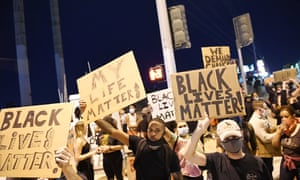The Guardian view on the death of George Floyd: a turning point?
The nationwide protests following the brutal suffocation of an unarmed black man in Minneapolis could be a defining moment in America’s racial politics

Photograph: Denise Truscello/Getty Images
“I do not want to see him on a shirt just like the other guys.” Those were the words of George Floyd’s brother, Philonese, during a phone call last week with Joe Biden, the Democrats’ presidential nominee.
Every African American will have known instantly what he meant. Trayvon Martin, Eric Garner, Michael Brown, Walter Scott and now Floyd: the litany of names of black men who died as a result of encountering the wrong law officer at the wrong time continues to lengthen. Video footage, in the cases of Garner and Scott, revealed to the world the casual, unconscionable brutality with which their lives were taken from them. The shooting of 17-year-old Martin by a Florida community watch officer, and the decision of a jury to acquit his killer, led to the creation of the Black Lives Matter movement. But last week it was still possible, in America, for a white police officer to kneel for nearly nine minutes on an unarmed Floyd’s windpipe – in broad daylight – crushing the breath and life out of him.
The sheer scale of the protests over Floyd’s killing – breaking curfews and defying national guard troops, over six days and across nearly 40 American cities – suggests that this death may prove a turning point. Attempts to dismiss those participating as merely lawless rioters, or out-of-state “anarchists”, in the words of President Trump, wilfully misrepresent what has been a mass expression of revulsion and fury.
Against the backdrop of a Covid-19 death toll of more than 100,000, a defining and dangerous moment for America now looms. Long before Mr Floyd’s death, Covid-19, which disproportionately affects the less well-off, had brutally exposed the racial fault line still running through the social landscape of the US. The pandemic, chaotically mishandled by Mr Trump, has killed African Americans at almost three times the rate of white Americans. The economic devastation wrought by the disease has pushed the unemployment rate close to 20%, on a par with the Great Depression. Again, the fallout has disproportionately affected African Americans.
It is the United States’ great misfortune at such a time to be led by a president who sows division as a matter of political strategy. Bunkered down, now literally, in the White House, the president tweeted last week: “When the looting starts, the shooting starts.” The words echoed those of a notorious Miami police chief during racial unrest in 1967. They were unworthy of a politician holding any office, let alone that of the presidency. From his defence of far-right marchers in Charlottesville to the abuse of black football players who refuse to stand for the national anthem, Mr Trump has exacerbated racial division and exploited it to shore up his white voter base. Between now and November, there is a danger the president will attempt to act on the authoritarian undertones of his inauguration speech in 2017, when he talked of stamping out “American carnage” in the country’s inner cities.
Americans must hope that the protesters of recent days do not respond in kind to any such provocations. The Atlanta rapper Killer Mike has urged those marching across the US to take on prosecutors, mayoral offices, police chiefs and deputy chiefs in the voting booth, and to challenge those local structures of judicial and civic power, where systemic racism still thrives. A new generation of politicians, informed by the culture and insights of movements such as Black Lives Matter, will be required to follow through successfully on such a strategy. They may find allies in police officers such as those in New Jersey who have marched with protesters, or the police chief in Atlanta who condemned the use of Tasers by her officers and went out into the street to listen to demonstrators. But they will need to access the levers of power themselves; for America they cannot come of age soon enough.



